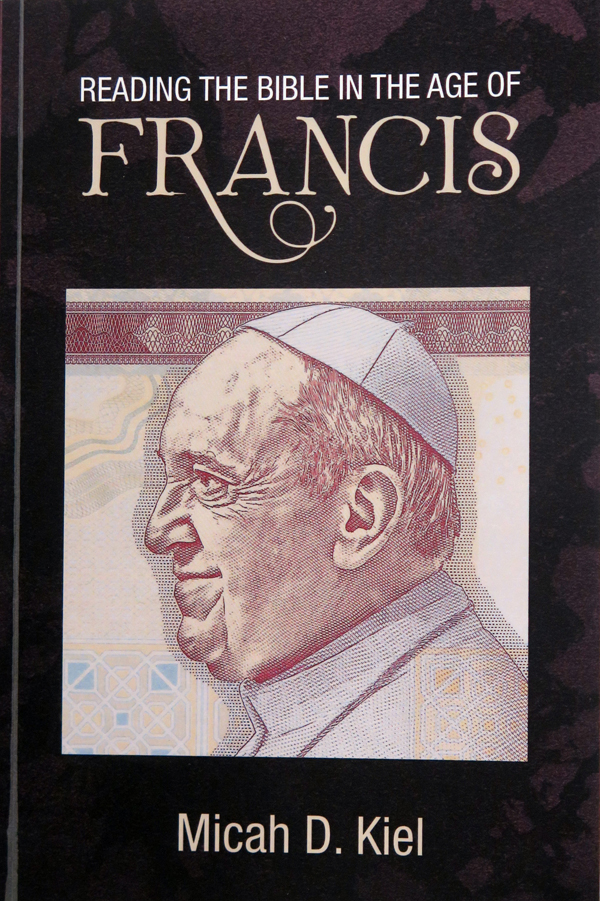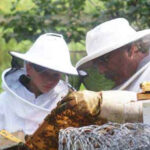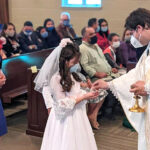SAU professor’s new book explores unique perspective of the pope
Book review by Barb Arland-Fye
“Reading the Bible in the Age of Francis,” by Micah D. Kiel, Cascade Books, Eugene, Oregon, $21 (paperback), www.wifpfandstock.com.
Pope Francis is deeply biblical, but in a way that may not be apparent to everyone, observes biblical scholar Micah Kiel, a professor at St. Ambrose University in Dav-enport. His new book, “Reading the Bible in the Age of Francis,” explores how deep themes across Scripture — not just bumper-sticker quotes — infuse the Holy Father’s ministry.

Micah Kiel write “Reading the Bible in the Age of Franics,” which is reviewed by Barb Arand-Fye.
Kiel is in his element with this book. Anyone who has ever taken one of his courses or listened to one of his lectures gains a fresh perspective on what Scripture has to say to us as individuals and as a people of faith.
His “Francis” book is approachable, geared toward readers who care about the lived experience of faith. Contemporary examples from Pope Francis’ ministry connect with Scripture. Kiel believes that critics of Pope Francis who are uncomfortable with how he talks about certain issues might “rethink that criticism if they knew how deeply biblical his emphases are.”
In his introduction, Kiel gives readers a brief preview of the eight chapters contained in the slim, 139-page book (the paperback version). Chapter 1 analyzes how Pope Francis tends to read the Bible. Chapter 2 explores the God of surprises, the idea that God does not follow the expectations of humans. And in some cases, neither does Pope Francis! Chapter 3 focuses on the Holy Father’s “pervasive call to be with the poor and marginalized. Perhaps no other hallmark of the Francis ministry has deeper roots in the Bible,” Kiel observes.
Chapter 4 explores what the Bible has to say about care for creation and people’s confusion about the term dominion as it relates to stewardship of God’s creation. Kiel points out that Pope Francis “frames this term in a broader way theologically, making it clear that we are not God and that the earth ultimately is the Lord’s.”
Kiel devotes chapter 5 to what he describes as a possible blind spot in Pope Francis’ ministry — reaffirming his predecessors’ decision that women cannot be ordained to the priesthood. “Writing about church teaching on ordination and what Francis has said about it might be the most important chapter in the book,” Kiel said. “It is probably the most common question and concern I get from young people in my classes and from people at my parish. I want people to understand the basis on which those church decisions have been made, and, at the same time, point out that there are some ways in which the use of Scripture in those arguments could be open to some re-thinking.”
In chapter 6, the Old Testament’s wisdom literature and the parable the Good Samaritan provide context for Pope Francis’ emphasis on mercy. Using a startling scenario to underscore the extraordinary example of mercy in Luke’s Gospel, Kiel writes: “Some people fear and dislike Muslims in the modern day United States. If your stereotypical gun-toting, anti-immigration American ended up in the ditch and was passed by a Baptist pastor and a US congressperson, only to be helped by a wealthy Muslim refugee, then we might begin to comprehend the picture Luke was trying to paint.”
Chapter 7 looks at Pope Francis’ opposition to those in the church who long for rigid adherence to law and rules. Kiel says parts of the Old and New Testament “evince a tension between God’s graciousness and religious rules; these texts can be instructive still today.”
The final chapter explores the connection between Pope Francis’ openness to unanswered questions and key Scriptural passages that suggest the same thing: “we should expect to be open to unanswered questions, and that faith is a journey where the next step is not always clear.”
Kiel acknowledges that “many of the things Francis says are challenging. They challenge the way we live our lives, structure our societies and practice our faith. The Bible does this as well. When reading the Bible, if we only find things that confirm what we already think, then we’re doing it wrong. The Bible, like Francis, will challenge us if we understand it.”
In his research, Kiel discovered a striking continuity among Popes John Paul II, Benedict XVI and Francis. In Pope Francis’ writings “we should note how often he finds inspiration from both of his predecessors (he quotes Paul VI a lot, too). For example, Benedict XVI was the real forerunner on ecological concerns in the church, to the point that he was actually dubbed the ‘Green Pope.’… Francis certainly has a different style and aesthetic than his predecessors, but his emphases are so deeply enriched by church teaching.”
The process of writing the book and meditating on Francis’ teaching and the biblical text impacted Kiel. He found it necessary to make some changes in how he lives his life to embody the things he was writing about. “One of my chapters is called ‘Francis’s God: A Master of Surprise.’ If one understands Scripture, and heeds the teaching of Francis, every turn of life will be a surprise, one infused with God’s grace.”











